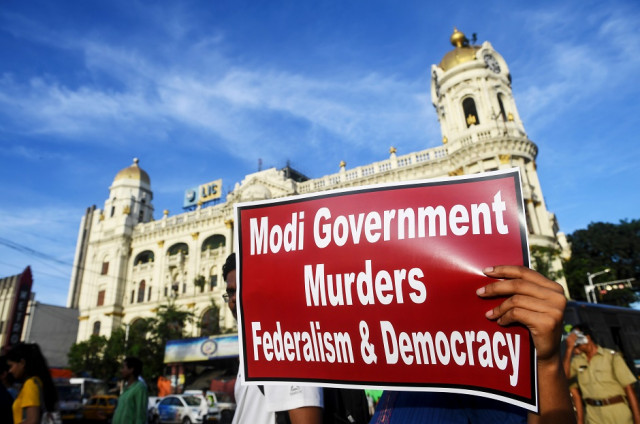ICJ questions legality of procedure adopted to revoke IoK special status
Indian high courts, SC have ruled that Indian president needs consent of J&K govt to change its status: ICJ

Protesters and social activists take part in a protest in Kolkata on August 6, 2019, in reaction to the Indian government scrapping Article 370. PHOTO: AFP
India, through a presidential decree on Monday, revoked the special status of IoK by abolishing Article 370 of its constitution, which granted autonomy and limited New Delhi’s legislative powers in IoK.
"The Indian government has pushed through these changes in contravention of domestic and international standards with respect to the rights of people in Jammu and Kashmir to participate and be adequately represented, accompanied by draconian new restrictions on freedoms of expression, assembly, and travel, and with an influx of thousands of unaccountable security personnel," said ICJ Secretary General Sam Zarifi.
"The legality of the Indian government’s measures to eviscerate Article 370 will certainly be tested before the Indian judiciary, which should look closely at the serious violations of proper legislative and Constitutional processes.
"All eyes are now on the Indian Supreme Court to fulfill its functions in defence of the rights of people of Jammu and Kashmir and the Indian Constitution."
The ICJ pointed out that the procedure adopted to revoke the special status "appears to be incompatible with judgments and observations of high courts and the Indian Supreme Court, who have clarified that the President of India would need the agreement of the government of Jammu and Kashmir to change its status."
"The revocation of special status of Jammu and Kashmir without agreement from the state government is contrary to the spirit of Article 370, which envisioned that the will of the people would be taken into account in decisions relating to state’s special status and autonomy," read the ICJ statement.
Zarifi said the Indian government had rushed through the amendments at a time when IoK was under New Delhi's direct rule and the state legislature was dissolved.
"As the government of Jammu and Kashmir is not empowered to discharge its functions, it has not been consulted, let alone agreed to the revocation," he said.
"The lack of consultation with the people of Kashmir is all the more troubling because the changes pushed by the Indian government will materially affect Kashmir’s status as India’s only Muslim-majority state, including special rights for citizens of the state to own and hold land and seek education and employment."
The ICJ statement concluded with a condemnation of India's legislative steps on IoK, and a call for New Delhi to implement in full the UN High Commissioner’s recommendations, including respecting Kashmiris' right to self-determination and protecting their human rights.



















COMMENTS
Comments are moderated and generally will be posted if they are on-topic and not abusive.
For more information, please see our Comments FAQ